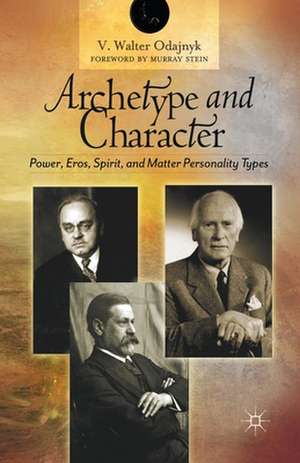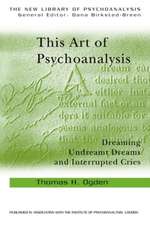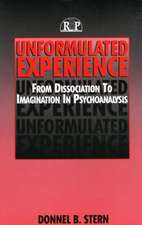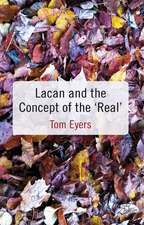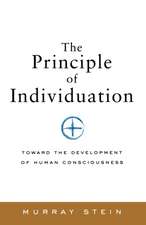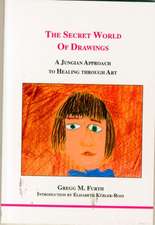Archetype and Character: Power, Eros, Spirit, and Matter Personality Types
Autor V. Odajnyken Limba Engleză Paperback – 2012
| Toate formatele și edițiile | Preț | Express |
|---|---|---|
| Paperback (1) | 638.76 lei 6-8 săpt. | |
| Palgrave Macmillan UK – 2012 | 638.76 lei 6-8 săpt. | |
| Hardback (1) | 644.18 lei 6-8 săpt. | |
| Palgrave Macmillan UK – 25 iul 2012 | 644.18 lei 6-8 săpt. |
Preț: 638.76 lei
Preț vechi: 751.47 lei
-15% Nou
Puncte Express: 958
Preț estimativ în valută:
122.22€ • 127.96$ • 101.13£
122.22€ • 127.96$ • 101.13£
Carte tipărită la comandă
Livrare economică 05-19 aprilie
Preluare comenzi: 021 569.72.76
Specificații
ISBN-13: 9781349349241
ISBN-10: 1349349240
Pagini: 264
Ilustrații: XXIV, 264 p.
Dimensiuni: 140 x 216 mm
Greutate: 0.37 kg
Ediția:1st ed. 2012
Editura: Palgrave Macmillan UK
Colecția Palgrave Macmillan
Locul publicării:London, United Kingdom
ISBN-10: 1349349240
Pagini: 264
Ilustrații: XXIV, 264 p.
Dimensiuni: 140 x 216 mm
Greutate: 0.37 kg
Ediția:1st ed. 2012
Editura: Palgrave Macmillan UK
Colecția Palgrave Macmillan
Locul publicării:London, United Kingdom
Cuprins
Foreword Preface Acknowledgments Introduction: Typology The Archetypes of Power, Eros, Pneuma and Physis Power, Eros, Physis and Pneuma Personality Types Soulful and Spirited Temperaments Temperament and Theory: Freud, Adler and Jung Sigmund Freud: Introverted Spirited Power Physis Type Alfred Adler: Extraverted Soulful Physis Eros Type C.G. Jung: Introverted Soulful Power Pneuma Type: I C.G. Jung: Introverted Soulful Power Pneuma Type: II Conclusion Appendices Appendix I: Jungian Archetypal Typologies Appendix II: Primacy of Spirit in theI Ching Addendum: Archetypal-Motivational Typology Scale Notes Bibliography Index
Notă biografică
V. WALTER ODAJNYK serves as Core Faculty member of the Pacifica Graduate Institute, California, USA. He is a former Assistant Professor of Political Science at Columbia University, USA,and the author of Marxism and Existentialism, Jung and Politics and Gathering the Light: A Jungian View of Meditation. A diplomat of the C.G. Jung Institute, Zurich, he is licensed as a Research Psychoanalyst by the Medical Board of California and a member of the C.G. Jung Study Center of Southern California.
Descriere
Descriere de la o altă ediție sau format:
Archetype and Character introduces a new typology based on unconscious motivations. It relies on C. G. Jung's description of the unconscious as composed of a personal and an archetypal layer. The book describes four archetypes, Power, Eros, Matter and Spirit, as the fundamental motivations that define human attitudes and behavior. This archetypal-motivational typology is contrasted with Jung's and its popular version, the Myers-Briggs Type Indicator, which rely solely on the conscious functions of thinking, feeling, sensation, and intuition. The book outlines eight personality types based on the extraverted and introverted deployment of the above four archetypes. It then applies these typological categories to Freud, Adler and Jung so as to highlight heretofore neglected aspects of their personalities and to understand the reasons for their personal and theoretical disputes. A concluding chapter summarizes the practical findings, cultural implications, and theoretical insights gained from this manner of understanding the basic principles that motivate human behavior.
Archetype and Character introduces a new typology based on unconscious motivations. It relies on C. G. Jung's description of the unconscious as composed of a personal and an archetypal layer. The book describes four archetypes, Power, Eros, Matter and Spirit, as the fundamental motivations that define human attitudes and behavior. This archetypal-motivational typology is contrasted with Jung's and its popular version, the Myers-Briggs Type Indicator, which rely solely on the conscious functions of thinking, feeling, sensation, and intuition. The book outlines eight personality types based on the extraverted and introverted deployment of the above four archetypes. It then applies these typological categories to Freud, Adler and Jung so as to highlight heretofore neglected aspects of their personalities and to understand the reasons for their personal and theoretical disputes. A concluding chapter summarizes the practical findings, cultural implications, and theoretical insights gained from this manner of understanding the basic principles that motivate human behavior.
